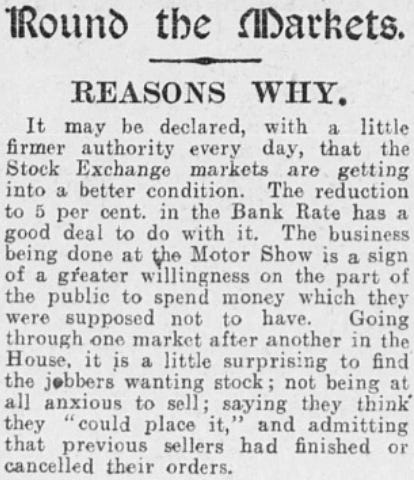November 7-13, 1921
This week, stocks close 20% off the August low and officially enter the 1921-1929 bull market.
Quick Stats:
DJIA: 75.75 (Today: 36,328)
Shiller PE Ratio: 5.8 (Today: 40.0)
Federal Reserve Bank of NY Discount Rate: 4.5% (Today: 0.25%)
GBPUSD: $3.95 (Today: $1.35)
Price of The Wall Street Journal: $0.07 (Today: $4.00)
Market-Moving Themes:
Sentiment slowly turning positive as business activity improves and financial conditions ease; high taxes still an issue (equity, debt markets)
Wartime raw material shortages are ending, paving way for price stability (commodity markets)
European post-war debt payments are causing a strong dollar as gold flows to the United States (currency markets)
Executive Summary:
Hope rather than confidence describes the present financial situation. On Wednesday, the Dow officially closes 20% off its low set in August. The FT stock editor illustrates the mood on the ground. Slowly but surely the markets are finding their footing.
Companies ranging from Ford Motor Company to Union Pacific Railroad report substantially improved business activity for the month of October. The current recession may have ended in the summer. Aggregate bond purchases were the largest since one year ago as Americans finally start investing again. Opinion articles, however, advise against common stock and its gambling attributes.
Historical Fact: American and international investors will soon assume high GDP growth is a feature of the American economy, as God-given and laid down in the natural order as the seasons. At the end of 1921, however, it’s not yet clear elements are present for business revival.
An interesting article about the state of the money supply in the United States hits the papers. When the gold standard was relaxed after World War I across the developed world, the US kept convertibility. An article notes that the money supply is 88% backed by gold rather than the required 40% due to strong inbound gold flows. America should have no issue accessing credit in the coming recovery, it surmises.
Historical Fact: Credit is an invisible commodity affecting every way of life for Americans in the 1920s. It will play an important role in the supercharged environment later in the decade.
This Armistice Day will be a somber one, with President Warren Harding dedicating the Tomb of the Unknown Soldier in Arlington National Cemetery. Americans have been absorbed in the struggle of peace negotiations for almost as long as the Great War lasted. Although business conditions are improving, the human psyche sits in the doldrums.
We end with an excerpt from the most enduring World War I poem:
In Flanders Fields, the poppies blow
Between the crosses, row on row,
We are the dead. Short days ago
We lived, felt dawn, saw sunset glow,
Loved and were loved, and now we lie,
To you from failing hands we throw
The torch; be yours to hold it high.
— In Flanders Fields by John McCrae, 1915
Reading this newsletter is free. If you enjoy it, then please share to a friend or donate via PayPal (button below). You may also follow us on Twitter.








